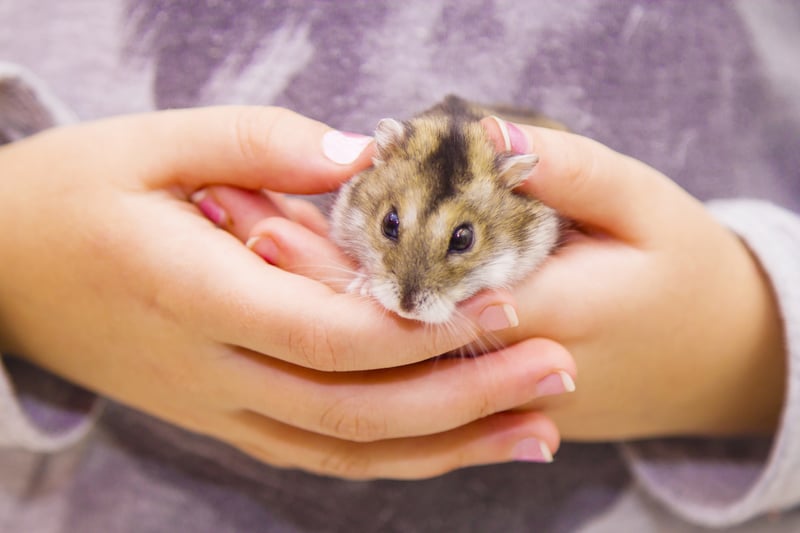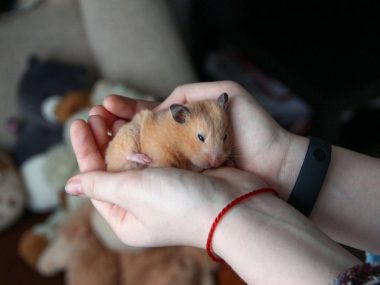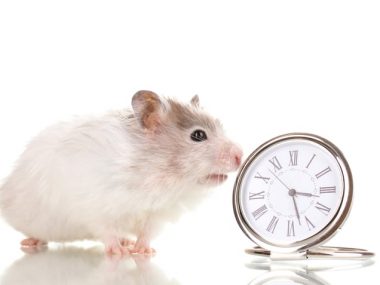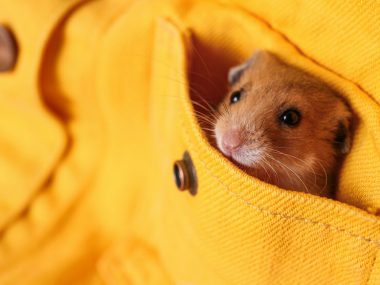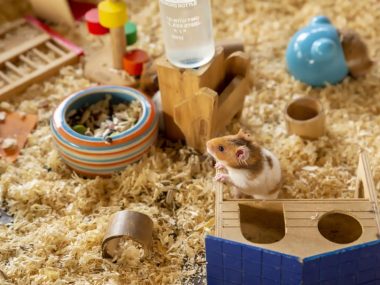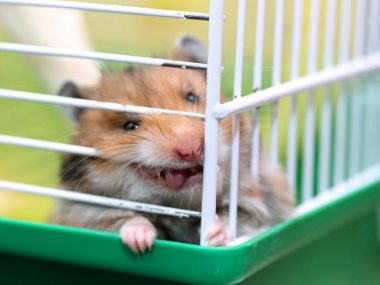Hamsters are creatures of prey. This makes them quite skittish and, they often resort to biting when feeling threatened. If your hamster is aggressive and constantly biting you, there are a few methods you can try to train your hamster out of this bad habit.
Here are 7 tips to stop your hamster from biting you:
- Wash your hands with unscented soap before handling.
- Don’t startle your hamster.
- Speak softly around your hamster.
- Reward your hamster with treats when it doesn’t bite you.
- Let your hamster sniff the back of your hand before handling them.
- Give your hamster enough space.
- Be Patient with your hamster.
In the rest of this article, we will delve into 7 steps that will help stop your hamster from biting you. We’ll also go over frequently asked questions about hamsters that bite, as well as some of the warning signs your hamster is going to bite you.
Table of Contents
1. Wash Your Hands With Unscented Soap Before Handling
When trying to assess what is causing your hamster to lash out and bite you, it a good idea to get this step out of the way first. Just make sure you wash your hands thoroughly with unscented soap before handling your little hamster.
Hamsters are highly sensitive to smells, and they may not be a huge fan of yours yet. So be patient with your hamster as it tries to get used to your new smell.
Another primary reason your hamster might be biting you is that your hands smell like food. Hamsters have poor eyesight and rely heavily on their sense of smell, so they might be accidentally confusing your fingers for a snack.
Here are a few other methods you can try to help your hamster get familiar with your scent:
- Wear gloves when handling your hamster. This way, it can’t bite you, and the gloves will still smell like you.
- Take a small piece of paper towel, rub it on your face and hands, and then place it in the hamster’s cage. This will help the hamster get familiar with your scent, and chances are it will use the paper towel as part of its bedding.
Washing your hands is a great way to deduce if your hamster has a problem with how you smell.
2. Don’t Startle Your Hamster
Because they’re prey animals, hamsters get easily startled. If your hamster is biting you, it’s probably because they’re frightened. Luckily, this is something you can avoid.
Here are some ways you’re probably startling your hamster:
- You are touching them when they are sleeping.
- You are trying to grab them from behind or above.
- You are making quick or sudden movements.
- You are speaking too loudly around your hamster.
To avoid startling your hamster, it is crucial to never bother them when they are sleeping and to move slowly when handling them.
3. Speak Softly Around Your Hamster
Loud voices can significantly stress or scare a hamster. This is why it’s essential to speak softly when around your hamster, especially if your pet is still getting used to you.
A great way to get your hamster used to your voice is to speak to them softly through their cage. This is an excellent method to slowly acclimate your hamster to you and help them feel calm about your presence.
Remember, loud noises can include things like:
- Music
- TV
- Videos
So if you are watching something loud in the same room as your hamster, consider turning it down so as not to stress out your little friend.
4. Reward Your Hamster With Treats When It Doesn’t Bite You
If you want your pet hamster to stop biting you, a great way to achieve this is to give your little furball a treat when they don’t bite you. Positive reinforcement will affirm good behaviors, and the hamster will start looking forward to the treat.
Also, hand feeding your hamster is a great way to build trust with your pet.
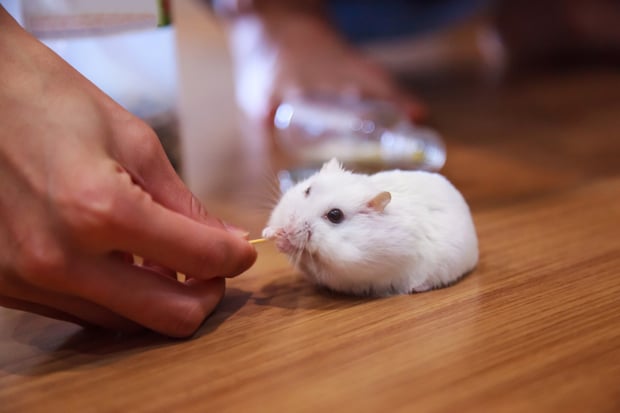
5. Let Your Hamster Sniff the Back of Your Hand Before Handling Them
Rather than grabbing your hamster when it’s still wary of you, consider letting your tiny friend sniff the back of your hand first.
The back of your hand has far fewer folds for hamsters to bite onto, and the back of your hand may appear less threatening because it’s flat. This makes it less likely that your hamster will be afraid of being picked up by your hand.
6. Give Your Hamster Enough Space
Hamsters can often become cage aggressive and quite territorial of their space, which is why you may have found that you are unable to handle your hamster when in its cage but have no trouble when your pet outside of its home.
The best way to combat cage aggression is:
- Never chase your hamster around its cage. If your hamster doesn’t want to be held, leave it alone.
- Make sure your hamster has plenty of places to hide. Hamsters like to hide when they are sleeping to feel safe. You don’t have to spend a ton of money on a good hideout for your furry friend. The Niteangel Multi-Chamber Hamster House (available on Amazon) is an affordable option that your furry friend is sure to love.
- Never lift up a hide your hamster is sleeping under. Your hamster’s hiding place is their safe space, and if you invade that space, it can result in your hamster feeling unsafe and upset.
- Make sure your hamster’s cage is large enough. Your hamster’s space should be at least 24 inches (610 mm) by 12 inches (305 mm) with plenty of toys and hides to keep your hamster engaged and happy.
When it comes to training your hamster not to bite, the more space your hamster has to live and play, the less likely they are to be overly territorial about their cage.
7. Be Patient With Your Hamster
Last but not least, be patient with your furry friend. Training your hamster to stop biting will take time. You might get your hamster to stop biting in a matter of weeks, but you should be prepared for the process to take months.
Each hamster is different, and depending on the breed, the proces may be more difficult. Dwarf hamsters are known for biting more than other breeds.
This doesn’t mean that a dwarf hamster won’t make a good pet. You will simply have to work a little more to win the trust of your furry friend.
Patience is vital when training your hamster not to bite. Be patient with your tiny friend, and you will see progress.
FAQ
Why Does My Hamster Bite Me?
Your hamster will bite you if it is scared, thinks you smell like food or is guarding its cage. These are the most common reasons for hamster aggression, and it will take time to train your hamster to stop biting you.
Hamsters defend themselves by biting, so it is essential to refrain from forcing contact with your furry friend, wash your hands with a scent-free soap before handling, and be careful not to startle them in any way.
What Do You Do if Your Hamster Bites You?
If your hamster bites, you don’t fret. This is very typical behavior for a small rodent to exhibit.
If your hamster bites you, you should stay calm and not yank your hand away. Always move slowly when handling your pet. If there’s a wound, wash it thoroughly with water and soap.
Hamsters bite when they feel threatened or startled. If your hamster continues to bite, you can try hand-feeding to build more trust.
It will take time to train your hamster out of biting, and one of the worst things you can do when they bite is overreact and scare them further. It’s essential to always remain calm—this will help your pet trust you and usually result in fewer bites.
Do Hamsters Give Love Bites?
Have you ever noticed that sometimes your fluffy hamster likes to nibble on you softly? What exactly does this behavior mean?
Hamsters give love bites occasionally. You can tell the difference between an affectionate nibble and an aggressive bite by the force behind it. An occasional gentle nibble is normal and means that your hamster likes you.
If you notice that your hamster is drawing blood, this is a sign of aggression rather than affection, and you should quickly take steps to deal with your hamster’s biting and figure out what has your hamster feeling so threatened.
Sources
- Quora: Why Is My Dwarf Hamster Biting Me?
- The Spruce Pets: How to Stop Your Hamster From Biting
- Chewy: How To Stop A Hamster From Biting
- RSPCA: Hamster Behavior
- Petsvills: 5 Possible Reasons Why Your Hamster is Biting You
- Hamster Guru: How To Train A Hamster Not To Bite
- Reddit: My Hamster Keeps Biting Me
- Reddit: Help! My Hamster Keeps Biting Me
- Reddit: How To Make A Hamster Stop Biting
- The Spruce Pets: Choosing the Best Cage for Your Syrian Hamster
- Hamster Hideout Forum: Love Bites?
- Reddit: Hamster “Love Bites”
